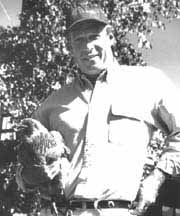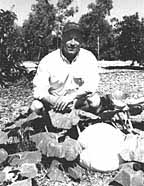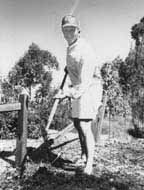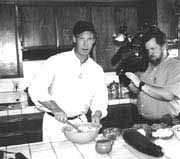






Loren Nancarrow
Concerned since youth with the ecology, Channel 8's environmental reporter
delivers practical tips . . . from his home to yours.
by Tedi Jackson
 oren Nancarrow was born in Seattle, Washington. When
he was five, his family moved to Trumbull, Connecticut where he spent the
next 12 years. He graduated from Eastern New Mexico University in 1975 with
a Double Major degree in Political Science and Mass Communication.
oren Nancarrow was born in Seattle, Washington. When
he was five, his family moved to Trumbull, Connecticut where he spent the
next 12 years. He graduated from Eastern New Mexico University in 1975 with
a Double Major degree in Political Science and Mass Communication.
 Loren started in broadcasting in 1972 as a D.J. for
a country music station in Portales, New Mexico. After working for a variety
of radio stations, he moved on to television in the mid-seventies as an
anchor at KENW-TV in Portales and KOB-TV in Alburquerque.
Loren started in broadcasting in 1972 as a D.J. for
a country music station in Portales, New Mexico. After working for a variety
of radio stations, he moved on to television in the mid-seventies as an
anchor at KENW-TV in Portales and KOB-TV in Alburquerque.
 In the early eighties, Loren began his first stint at
KFMB-TV in San Diego as an anchor and reporter. In 1988, Loren left to accept
an anchor position at KPIX in San Francisco. In February 1991, Loren rejoined
KFMB-TV where he handles the duties of weathercaster and environmental reporter.
Loren has won many awards for his reporting, including six Emmy Awards,
two Golden Mike awares and two UPI awards.
In the early eighties, Loren began his first stint at
KFMB-TV in San Diego as an anchor and reporter. In 1988, Loren left to accept
an anchor position at KPIX in San Francisco. In February 1991, Loren rejoined
KFMB-TV where he handles the duties of weathercaster and environmental reporter.
Loren has won many awards for his reporting, including six Emmy Awards,
two Golden Mike awares and two UPI awards.
 Loren, his wife Susie and their two children, Graham
and Hanna, live in rural North County where they raise chickens, ride their
horse and enjoy a variety of household pets.
Loren, his wife Susie and their two children, Graham
and Hanna, live in rural North County where they raise chickens, ride their
horse and enjoy a variety of household pets.
 ET: When did you start reporting on environmental
issues at Channel 8?
ET: When did you start reporting on environmental
issues at Channel 8?
LN: Probably from my first day. Back then, it was just the kind of
stories I liked to do. The stories would interest me. I would go out and
do a story on big white sheep or something and end up taking an environmental
slant on it without even realizing I was doing it.
 I've always felt very strongly about the environment.
- even with the first Earth Day back in New York City in 1970. My family
was active in that. I was a junior in high school and we trooped over to
New York City from Connecticut to attend and take part in it. I've never
joined groups but I've always tried to live a life that had little impact
on the environment.
I've always felt very strongly about the environment.
- even with the first Earth Day back in New York City in 1970. My family
was active in that. I was a junior in high school and we trooped over to
New York City from Connecticut to attend and take part in it. I've never
joined groups but I've always tried to live a life that had little impact
on the environment.
ET: Did Channel 8 support and encourage it?
LN: Oh yeah, they always did. When I left they invited me to come
back. At first, it was my boss's idea that I be a weatherman and an environmental
reporter. Now that has changed. To be an environmental reporter you need
to be a serious reporter. They did some research and found that viewers
were confused by my roles. Is he a friendly neighborhood weatherman - which
most people prefer - or is he a serious reporter dealing with environmental
and animal issues? Rather than have that confusion, they decided to take
me off reporting but allow me to be more of an environmental activist.
 Now I'm no longer handcuffed by the need to be even.
My views can be my own and I don't have to give industry's view, if industry
happens to be the culprit in a particular issue. So I can just say what
I think. And so far they have not tried to quiet me down.
Now I'm no longer handcuffed by the need to be even.
My views can be my own and I don't have to give industry's view, if industry
happens to be the culprit in a particular issue. So I can just say what
I think. And so far they have not tried to quiet me down.
ET: Does KFMB encourage recycling in the office, making double-sided
copies or using recycled paper?
LN: When I got back [from San Fransisco] I suggested that we use
ribbons with recycled ink. Suddenly I found $50 in a little trophy. They
give money and awards to people who come up with ideas that save the station
money and are a better way of doing things. There are blue recycling buckets
in every office. We are in a very paper-intensive business, and all the
paper is recycled. Downstairs they have boxes for cans and bottles. People
whose families are into aluminum recycling are religious about it. There's
never any overflow.
 I don't know if they used recycled paper on the main
stationery, but on all of mine they do - and I didn't even ask for it. I
felt bad that I hadn't asked for it. I sent out environmental tips and they
thought of it themselves.
I don't know if they used recycled paper on the main
stationery, but on all of mine they do - and I didn't even ask for it. I
felt bad that I hadn't asked for it. I sent out environmental tips and they
thought of it themselves.
ET: Who suggested the role of environmental correspondent?
LN: Jim, my boss, saw that the stories of mine that he liked best
dealt with the ocean or animals or something to do with the environment.
They had asked me to be an environmental reporter. It certainly wasn't a
concious effort to do those kinds of stories.
 I started doing environmental tips at the end of the
weather. Suddenly we started getting tons of mail and phone calls wanting
clarification on what the tip was - whether it was how to get rid of fleas,
or using a skunk instead of poison to get rid of yellow jackets. We got
a tremendous response.
I started doing environmental tips at the end of the
weather. Suddenly we started getting tons of mail and phone calls wanting
clarification on what the tip was - whether it was how to get rid of fleas,
or using a skunk instead of poison to get rid of yellow jackets. We got
a tremendous response.
 It's been fun. We've now published some pamphlets with
"Loren's Tips." The tips are things I've been learning out of
books published by people like the Environmental Health Coalition here in
town. There's a copious amount of reading material on different ways of
doing things. I have no shortage of information.
It's been fun. We've now published some pamphlets with
"Loren's Tips." The tips are things I've been learning out of
books published by people like the Environmental Health Coalition here in
town. There's a copious amount of reading material on different ways of
doing things. I have no shortage of information.
 ET: What are your favorite types of stories to report
on?
ET: What are your favorite types of stories to report
on?
LN: I'm not the kind of person who feels comfortable going out and
doing a story on the 72 worst polluters of San Diego Bay. I'm furious with
each one of those and I want a reporter to go and do the digging. I am not
that thorough. I will not spend the incredible number of hours needed to
do it right.
 What I like to do is show people ways - in their home,
individually, all by themselves, in the secret of their closet - that they
can make less of an adverse impact on earth. Aside from my children, my
two passions are gardening and animals. I have a little farm where I can
practice the methods that I talk about. We have a place that used to be
three acres of barren soil - just neat, trim dirt. I wanted an orchard,
and we have a quarter-of-an-acre pumpkin patch for my kids so they can invite
their classmates over and have pumpkins. And we have a vegetable garden
and chickens.
What I like to do is show people ways - in their home,
individually, all by themselves, in the secret of their closet - that they
can make less of an adverse impact on earth. Aside from my children, my
two passions are gardening and animals. I have a little farm where I can
practice the methods that I talk about. We have a place that used to be
three acres of barren soil - just neat, trim dirt. I wanted an orchard,
and we have a quarter-of-an-acre pumpkin patch for my kids so they can invite
their classmates over and have pumpkins. And we have a vegetable garden
and chickens.
 When we first moved we noticed that there was no native
wildlife at all. Now you can barely take a step without a baby lizard running
this way or a frog jumping that way. The birds are everywhere. We even have
mountain lions, bobcats and deer. Those big predators were probably there
before. Now they have a reason to return because now we're providing a little
something for them to live on.
When we first moved we noticed that there was no native
wildlife at all. Now you can barely take a step without a baby lizard running
this way or a frog jumping that way. The birds are everywhere. We even have
mountain lions, bobcats and deer. Those big predators were probably there
before. Now they have a reason to return because now we're providing a little
something for them to live on.
 The hipocracy is that I also have dogs and cats that
I think are too hard on the environment. Not so much my dogs, but the cats
- you know, my wife and kids love cats - are hard on the birds and lizards
and things. We try to prevent that with bells on the collars.
The hipocracy is that I also have dogs and cats that
I think are too hard on the environment. Not so much my dogs, but the cats
- you know, my wife and kids love cats - are hard on the birds and lizards
and things. We try to prevent that with bells on the collars.
 I like to do little things around my house - we don't
even call it my house, we call it the News 8 Farm. Viewers who pay close
attention probably have figured out that it's my house, but we try not to
say that. I want to show the viewers that I can grow great tomatoes without
spraying chemical fertilizers or using chemical pesticides.
I like to do little things around my house - we don't
even call it my house, we call it the News 8 Farm. Viewers who pay close
attention probably have figured out that it's my house, but we try not to
say that. I want to show the viewers that I can grow great tomatoes without
spraying chemical fertilizers or using chemical pesticides.
 Our garbage goes to the chickens. We accept the fact
that everyone can't have chickens. But if you take the scraps that normally
go down your garbage disposal and make compost, you're going to improve
the soil. Not only is it a problem that 50 percent of the nation's lakes
and rivers are not safe to swim fish in, but our topsoil is disappearing
and our garbage dumps are filling up. It's simple and fun - and by being
a personality and being silly on TV and saying that the stuff smells like
gold, somebody may try it.
Our garbage goes to the chickens. We accept the fact
that everyone can't have chickens. But if you take the scraps that normally
go down your garbage disposal and make compost, you're going to improve
the soil. Not only is it a problem that 50 percent of the nation's lakes
and rivers are not safe to swim fish in, but our topsoil is disappearing
and our garbage dumps are filling up. It's simple and fun - and by being
a personality and being silly on TV and saying that the stuff smells like
gold, somebody may try it.

ET: Do most people know very much about the environment?
LN: No. As a result they can be cheated or coerced into believing
people who are too far to the left environmentally or . . . Rush Limbaugh
is one of those people who, while I enjoy listening to him, sometimes gets
me absolutely infuriated. He promotes the whole notion that business, no
matter what it does, is going to be right. He thinks that when you call
a rain forest a rain forest that you're putting it in higher terms and making
it more important than it is. It's a jungle and that's all it is, he says.
That's simply not true. It's not even advanced thinking to know that the
Amazon basin is the lungs of the world. Every elementary student is trying
to save the rain forest and we're not doing diddly to save it.
ET: Are you working to focus your own kids toward helping the environment
or are they going to do it on their own?
LN: They're very young. I have a newborn, a 3-year-old and a 5-year-old.
It really is refreshing. The older two are in school - both have been in
school since they were 2. They learn much more about the earth now, so their
minds are already set that way.
 They're at the age where they probably think everyone
lives just like we do. My daughter is absolutely amazing in her love for
animals and bugs. She is apt to be walking around with a spider in her hand,
or a worm, or anything. She kisses earthworms. Without trying to push her
we do encourage that by not trying to freak her out about a lot of things.
She knows that rattlesnakes are poisonous. She could identify a black widow
if she saw one and not freak out about it. She could see a brown recluse
and just say, "Daddy there's a brown recluse over here. We gotta get
rid of this one." It's fun. They know to recycle and they know that
certain kinds of waste go into the chicken bucket.
They're at the age where they probably think everyone
lives just like we do. My daughter is absolutely amazing in her love for
animals and bugs. She is apt to be walking around with a spider in her hand,
or a worm, or anything. She kisses earthworms. Without trying to push her
we do encourage that by not trying to freak her out about a lot of things.
She knows that rattlesnakes are poisonous. She could identify a black widow
if she saw one and not freak out about it. She could see a brown recluse
and just say, "Daddy there's a brown recluse over here. We gotta get
rid of this one." It's fun. They know to recycle and they know that
certain kinds of waste go into the chicken bucket.
ET: Do you have anything special that you want to share with our
readers?
LN: We're such a beach community that I would hope that people would
get active about the beach. The water quality is horrible and it's gotten
much worse in the last 10 years. I don't get a sense that people are very
angry about that. I'm not sure why. There seem to be many things that need
changing and I think that frequently the beach ends up on the bottom of
the list.
 As long as as people aren't making a lot of noise about
it, the politicians aren't going do anything. They only want to get re-elected
so they go after the items that people seem to want done. If half of the
people that you see on the San Diego county beaches on a sunny day started
making noise about the water quality . . .
As long as as people aren't making a lot of noise about
it, the politicians aren't going do anything. They only want to get re-elected
so they go after the items that people seem to want done. If half of the
people that you see on the San Diego county beaches on a sunny day started
making noise about the water quality . . .
 Our friend's daughter fell and scraped her forehead
on the sand in Del Mar and got a horrible staph infection. The doctor said,
"Yeah, why would you be surprised?" There is so much bacteria
in the ocean water after the winter rains that if you get a cut in our ocean
you're in big trouble. Do we have to have diphtheria and all those horrible
diseases that we attribute to South and Central America before we're upset?
Our friend's daughter fell and scraped her forehead
on the sand in Del Mar and got a horrible staph infection. The doctor said,
"Yeah, why would you be surprised?" There is so much bacteria
in the ocean water after the winter rains that if you get a cut in our ocean
you're in big trouble. Do we have to have diphtheria and all those horrible
diseases that we attribute to South and Central America before we're upset?
 ET: So activism is the main thing you'd like to see?
ET: So activism is the main thing you'd like to see?
LN: At least getting angry. I hate telling people to get active because
I don't myself. I have a beautiful forum where I can say what I think. If
I get angry about something I go to the city council and try and talk to
them. If the people would let their elected officials know that they care
about the ocean and if they would care enough, something would happen.
ET: A recent survey on the 100 best places to live in the United
States used water quality as the number one criteria. We don't think about
water quality here in San Diego very much - we take it for granted. But
the people on the East Coast where the water is really bad . . .
LN: We've grown up thinking we have to drink bottled water because
the water tastes so bad, so maybe we don't think about water quality. I
don't know.
 I grew up in Connecticut, which I understand is not
terribly clean anymore, where we routinely drank the water from creeks.
We played in the woods and creeks all day. If you got thirsty, you just
drank the water out of the creek and we never got sick. I can't imagine
doing that today. There is a creek that runs behind my house called Escondido
Creek which used to be dry. Now it runs year round because of lawn runoff
and irrigation. It is thick with green algae because of nitrogen fertilizers.
People think that more is better; the greener it is, the more perfect it
is. It's just silly. Every rain takes it right into our waterways.
I grew up in Connecticut, which I understand is not
terribly clean anymore, where we routinely drank the water from creeks.
We played in the woods and creeks all day. If you got thirsty, you just
drank the water out of the creek and we never got sick. I can't imagine
doing that today. There is a creek that runs behind my house called Escondido
Creek which used to be dry. Now it runs year round because of lawn runoff
and irrigation. It is thick with green algae because of nitrogen fertilizers.
People think that more is better; the greener it is, the more perfect it
is. It's just silly. Every rain takes it right into our waterways.
ET: What does Earth Day mean to you right now. Do you think it's
a very important thing? Does it have any special place in your life?
LN: On a worldwide level I think we're in big, big trouble. Here
in the United States we are comfortable enough that we can address some
of these concerns. The poor Amazonian farmer, who just is trying to feed
his family, doesn't care if he takes out a hectare of forest. There's nothing
we can do here, sitting in our comfy homes, to make him care about it. I
think anything the United States tries to do is important - we're the culprit.
I understand that people with a higher standard of living use more raw materials
and do more environmental damage.
 Earth Day . . . I just don't want people to think that
there is one season - the season when we're getting ready for Earth Day
and the days immediately following it - that is the time to care about the
Earth. I almost hate the way it sounds, "Caring about the Earth"
and all that. So many of our sayings seem obsolete, because they're nothing
more than a fad. I think it's time to change the way we live and borrow
some from our ancestors. Just take care of our own trash, mostly. I think
if each person did that, and used fewer products and understood more about
the products we use, it would make a difference.
Earth Day . . . I just don't want people to think that
there is one season - the season when we're getting ready for Earth Day
and the days immediately following it - that is the time to care about the
Earth. I almost hate the way it sounds, "Caring about the Earth"
and all that. So many of our sayings seem obsolete, because they're nothing
more than a fad. I think it's time to change the way we live and borrow
some from our ancestors. Just take care of our own trash, mostly. I think
if each person did that, and used fewer products and understood more about
the products we use, it would make a difference.






 ET: When did you start reporting on environmental
issues at Channel 8?
ET: When did you start reporting on environmental
issues at Channel 8? ET: What are your favorite types of stories to report
on?
ET: What are your favorite types of stories to report
on?
 ET: So activism is the main thing you'd like to see?
ET: So activism is the main thing you'd like to see?